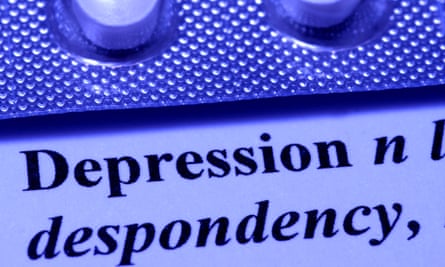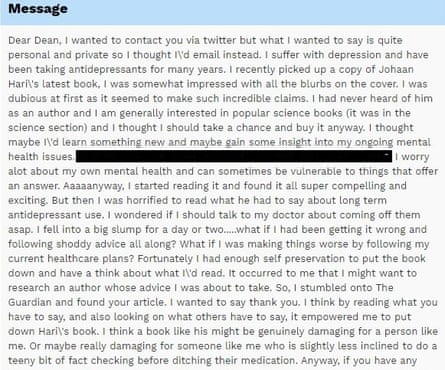Please, do not just abandon your medication.
If you’ve been prescribed drugs to treat an illness, suddenly dropping it altogether – for whatever reason – is invariably a very bad move. And this is as true for things like antidepressants as it is for insulin or antibiotics. Antidepressant withdrawal syndrome is a real problem.
It doesn’t effect everyone equally, but that’s always been the case with antidepressants. The effects can be really profound and debilitating though, including a spike in anxiety, alarming “brain zaps”, and more. For better or worse, if you’ve been taking antidepressants for a number of weeks, your brain has slowly adapted to the new chemical levels and balance that they have brought about. A sudden cessation will rapidly alter this again, potentially causing all manner of problems, and possibly cause the underlying issue (ie depression) they’re supposed to be treating to return with a vengeance. This is why the specific dose and schedule of antidepressants is very carefully considered. If you do genuinely want to come off your antidepressants, please speak to your GP or medical expert, work out a system for gradual reduction and cessation and make plans and preparations for what could happen, as it could leave you unable to function normally. If you’re going to do it, please do it carefully, and thoroughly.
Please, do not just abandon your medication.

Why tell you this? Well, it suddenly seems necessary, due to Johann Hari and his efforts to promote his new book about the “real” causes and treatments of depression. I have already been one of the people to take issue with his claims, and I still stand by this. Hari may genuinely believe all that he says and honestly feel that he’s doing good, important work. Sadly, I and many others can’t help but find his arguments and conclusions highly questionable and potentially harmful when it comes to the attitudes people have towards medication for psychiatric illness, and mental health in general.
Mental health, and all the associated ailments, is far from a simple subject with easily observed causes and effects. The intangible, often hugely subjective, nature of mental health problems is one of the reasons why the “medical model” approach to treating them is so often criticised; the patient is more than just a passive recipient of treatments and therapies, like someone with an infection being told which antibiotics to take and obeying without question. When it comes to maladies of the mind – things that affect mood, cognition, motivation, perception etc – logically, the individual has to play a larger role in dealing with them. The affected person is the only ones with any real access to the issues after all. Hence many people champion a more “psychodynamic” approach to psychiatry, where patients have a much larger contribution to make.
Looked at this way, Hari’s conclusions about his own depression and how it should be dealt with are as valid as anyone’s, probably more so. So what’s the problem?
The problem is that Hari’s arguments aren’t limited to himself. The very nature of a psychodynamic approach means any workable solution found is less likely to apply to anyone else, as it’s something that incorporates the subjective nature of the person’s problems. By contrast, Hari’s arguments have received blanket media coverage, a disconcerting advertising campaign, and countless high-profile endorsements. Basically, his arguments are being shared far and wide to huge audiences, with the endorsement of many respected individuals and publications.
Why is this bad? Well, I received this message to my personal website, which perfectly illustrates the worst fears of myself and others.

Please, do not just abandon your medication.
This is just one example of someone who ended up doubting the recommended therapy for their genuine issues in light of Hari’s arguments. Thankfully, this person had the wherewithal and inclination to double check what was claimed, but some brief digging online suggests there are others considering/deciding to ditch their psychiatric medication because of Hari’s claims.
In fairness, there’s no indication that Hari actually states at any point that anybody else should stop their medication, so that accusation cannot and should not be levelled at him. But his attitude towards antidepressants could hardly be described as fair and balanced. The closest he comes to a defence of them seems to be the observation that “some credible scientists argue that they give some temporarily relief to a minority of users”. A highly questionable conclusion, which really depends on flexible definitions of “credible”, “temporary” and “minority”. So while Hari may not specifically state that anyone should give up their medications, he does seem to constantly question and throw doubt on the use and validity of antidepressants (and those who endorse them) for a target audience that’s, by definition, highly prone to negative thinking and pessimism. It’s not far fetched to envisage this leading to some seriously unhelpful outcomes.
Please, do not just abandon your medication.
That’s the only real point of this article. Even if you agree with everything Hari says , please; if you’re on antidepressants and have been for a while, don’t cut off your medication all at once.
Take it slow, get help and advice, do it gradually and carefully. It’s not like ripping off a bandage or plaster, one sharp shock and it’s all over. It’s more like slamming your brakes on while in the fast lane of the motorway: it may be safe in other scenarios, but you’re currently in a situation where that’s extremely hazardous. And it may even be the case that, while they don’t make you feel noticeably better, the antidepressants are allowing you to function sufficiently to pursue other approaches. They may not be as helpful as you’d hope, but they could be a vital component of a suite of approaches that eventually proves helpful.
There are many good and valid reasons to stop taking antidepressants, and many of the concerns raised by Hari’s writing, like the societal over-reliance on medication and the unethical behaviour and practices of pharmaceutical companies, are indeed important concerns that should be more publicised.
But, regardless of the hows and whys of the current situations, we’re talking about a psychoactive drug here. Even if you honestly don’t believe they have any benefit, the fact that they have any side effects at all shows they’re clearly doing something to you. They have an effect, whatever it may be, and that effect is something your body and brain will have adapted to over time; the system was disrupted at first, but has since got used to it. If you suddenly remove an element it’s got used to, your system is going to be disrupted again, and that’s highly unlikely to be something that’s good for you.
So, if for that reason alone, please, do not just abandon your medication.
Dean Burnett addresses the mechanisms and stigma of depression in his own, admittedly far less successful book, The Idiot Brain is available now, in the UK and US and elsewhere.
If you are affected by depression or suicidal thoughts, there are places you can turn to. In the UK, Samaritans can be contacted on 116 123. In the US, the National Suicide Prevention Lifeline is 1-800-273-8255. In Australia, the crisis support service Lifeline is on 13 11 14. Other international suicide helplines can be found at www.befrienders.org.
Note by readers’ editor, Paul Chadwick, added 7 February 2018: After publication, I considered a complaint relating to Guardian and Observer coverage of the book: an extract; Q&A with the author; review; blogpost on 8 January; and this blogpost. I concluded that the book’s author, Johann Hari, and his critic, Dean Burnett, were entitled to their differing views, and that the Guardian and Observer editorial standards had been met. Due to the sensitivity of the issue involved - namely, the causes and treatment of mental illness - I also concluded that it was appropriate to emphasise for readers that the author and his critic have both expressed the view that people taking anti-depressants should not stop taking their medication abruptly or without seeking professional advice.
